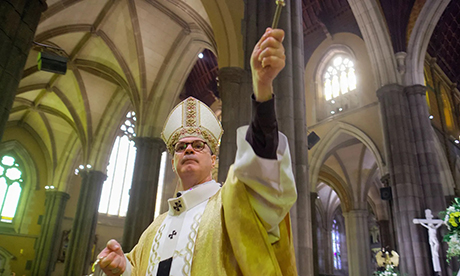Melbourne Catholic Archbishop Peter Comensoli is facing dissent from within over ambitious plans to restructure the archdiocese.
Comensoli told his diocesan clergy and parish lay leaders that the diocese is on a ‘threshold’ and either we do something or ‘sink into the sunset’.
He conceded the church’s painful history and parishioners abandoning the pews had caused serious challenges.
The Archdiocese currently has 209 parishes with an average of 5052 Catholics. But only 13% of Catholics across all parishes typically attend weekend Mass. In the largest parishes as few as 6% attend.
In briefings to church officials, the Catholic leader has suggested overhauling Melbourne’s 209 parishes into about 50 to 60 “missions”.
The missions would be parishes grouped together based on common districts, ethnic communities or needs.
Under the plan, which could take between three and five years to implement, two priests could be based at each mission. They would live together in the same residence enabling resources to be pooled.
Figures show that the Catholic church is struggling to address priest shortages. More than half of the 224 priests and 28 seminarians in training in Melbourne 2019 were either born or recruited from overseas.
Archbishop Comensoli has not suggested the restructure would result in parishes being forced to close. Instead, he insisted that the shift was merely designed to help parishes thrive and adapt to “changing circumstances” confronting the church.
The Archbishop’s comments come less than three months before the most significant conference Catholic Bishops have held in years, the Plenary Council. The meeting is due to take place in October.
While Catholics are pushing for reform, some have accused the Archbishop of failing to do the very thing the Plenary Council process promised. That is to consult with lay people about the structure and governance of the church.
“Comensoli has effectively thumbed his nose at the Plenary Council,” said Catholics for Renewal spokesman Peter Wilkinson. “He has made a unilateral decision, settled on his own proposal, and then, only afterwards, invited them to comment on its implementation.”
The Archdiocese has rejected these concerns, telling The Age that parishes would not be abandoned. The consultation process began a few weeks ago with two major briefings involving clergy and lay representatives.
“This is not an ‘imposition’, but a response to having listened within the Archdiocese,” a spokeswoman said.
“This will be a long journey. The next steps include regional meetings in August and September, followed by more local gatherings in October and November. All gatherings will involve both clergy and lay representatives, chosen at the local level.”
Sources
Additional reading
News category: World.




